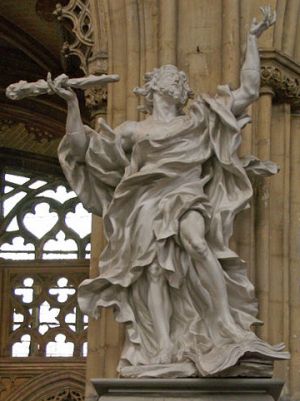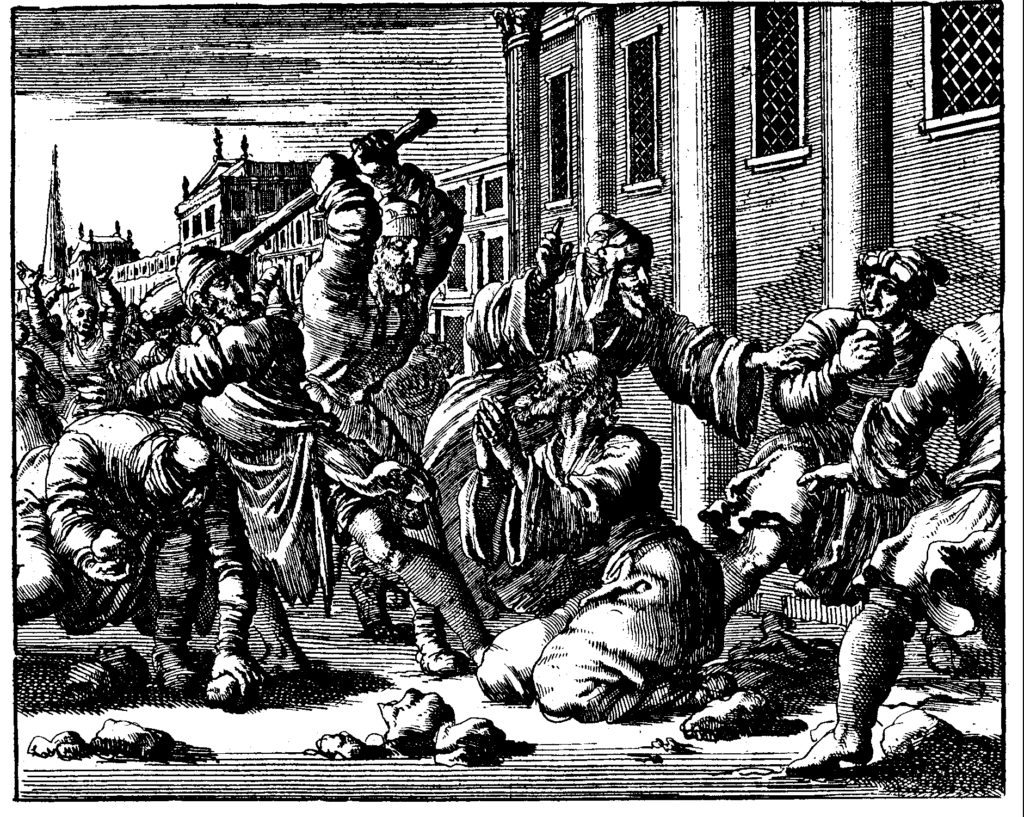James – ‘Bulwark of the People’

As well as being known as ‘James the just’, he also had another nick-name and was known as a ‘bulwark of the people’. Hegesippus, a first century Christian writer, and other early Christians saw James as an un-shakeable bastion of the Christian faith, a solid wall that gave them strength to persevere through any storm. The apostle Paul also hailed him as one of the great pillars of the church (Galatians 2:9).
James was a common name in biblical times and its Hebrew equivalent is Jacob. Sometimes, James ‘the just’ can be confused with another two-people called ‘James’ who are mentioned in the New Testament. They are:
James the son of Zebedee (John’s brother) and one Jesus’ twelve disciples (Matthew 10:2). This James was also included in Jesus’ closer circle of three; Peter, James and John who were with Jesus at key moments such as at His transfiguration (Matthew 17:1-13) and at the raising from the dead of Jairus’ daughter (Mark 5:21-43). He was put to death by King Herod in approximately AD44 (Acts 12:1).
James the son of Alpheus, was also one of Jesus’ Twelve disciples (Matthew 10:3). He is often identified as ‘James the Less’ in Mark 15:40 (or ‘younger’ as the NIV translates). He is usually only mentioned in the New Testament each time a list of the twelve disciples appears.
James or ‘James the Just’ is one of Jesus’ half-brothers. In Galatians 1:19, the apostle Paul states that three years after his conversion experience, he saw Peter first and then he, “saw none of the other apostles, only James, the Lord’s brother.” It is highly probable that Paul is using the word, ‘apostle’, not in the context of the original twelve (otherwise he would be referring to James, the son of Alpheus), but he is using the word in the true sense of the meaning of the word as a ‘sent one’, just as indeed Paul and Barnabas were referred to as ‘apostles’ but clearly not part of the original twelve.
James’ Conversion
Evidently, James must have had a massive change of heart concerning Jesus as we read that, at first, he was highly sceptical about the claims that Jesus was making about Himself (John 7:5). Indeed, at one time, Jesus’ whole family (including James) thought that He was ‘out of His mind’ (Mark 3:21).
We don’t know precisely when James went from being a sceptic to becoming a believer and subsequent pillar of the church. However, we do have a massive clue as James’ life alters drastically after Jesus appears to him after His resurrection (1 Corinthians 15:7).

Statue of James the Just in Liege, Belgium
The Ministry of James
After his conversion, James became a very important and prominent person in the church.
After his miraculous escape from prison, Peter told others to report the news to James first. Then, as we have already seen, shortly after his conversion, Paul chose to meet James (Galatians 1:19).
It is clear that James then went on to be an important elder in the church at Jerusalem as In Acts chapter 15, we read how a sharp dispute broke out between Paul & Barnabas concerning how the converted gentile believers were to behave. It was James who stood up and declared the council’s judgement (Acts 15:19-21).
The great apostle Paul even reported to James as we read that when Paul returned to Jerusalem from a missionary trip, he reported to James and all the other elders as to what God had done among the gentiles through his ministry (Acts 21:17-19).
James went on to write a letter to “the twelve tribes scattered among the nations” which is now part of our New Testament. Further proof of his remarkable conversion from sceptic to ‘pillar of the faith’ is revealed by the fact that in his letter, James, in utter humility, refuses the temptation to identify himself as the Lord’s brother but merely refers to himself as a servant of God and of the Lord Jesus Christ.’ Which, incidentally, is mirrored by another half-brother of Jesus, Jude, who opens his letter in a similar manner.
It is thanks to his great epistle that we get the complete meaning and definition of ‘saving faith’. Paul, in his letters to the Ephesians and Galatians show us that we are saved by grace, through faith and not through works of the Law. However, it is James, who teaches us that true faith must be accompanied by works otherwise it is dead (James 2:14-26).
Not long after writing his epistle, James was martyred in Jerusalem in A.D.62.
The Martyrdom of James
Unlike all the other apostles, James never left Jerusalem and we know that because of his boldness of faith he became a constant thorn in the side to the Pharisees and Sadducees who found any preaching or teaching about Jesus to be totally abhorrent to them. Subsequently, the historian Josephus, tells us that a new high priest by the name of Ananus saw an opportunity to make a name for himself. There was a change in the Roman procurator and while the new procurator, Albinus, was on the way, Ananus saw the opportunity to get rid of James. He saw it as a window of opportunity to accuse and put James to death without the trial that the new procurator would have demanded under Roman law. Although Ananus got his way, it backfired heavily on him as when Albinus finally arrived he had Ananus dismissed from his position of high priest as soon as he heard what had happened.
Eusebius, a fourth-century church historian, adds details of James’ death. He states that the scribes and Pharisees took James to a public place, the top of a wing of the temple, and “demanded that he should renounce the faith of Christ before all the people …” But, rather than deny Jesus, James “declared himself fully before the whole multitude, and confessed that Jesus Christ was the Son of God, our Saviour and Lord”
Hegesippus, tells us that at this point “they went up and threw down the just man (from the temple height), and said to each other, ‘Let us stone James the Just.’ And they began to stone him, for he was not killed by the fall, but he knelt down and said, ‘I entreat thee, Lord God our Father, forgive them, for they know not what they do’ (thus following his brother’s example to the last). One of them, who was a fuller, took the club with which he beat out clothes and struck the just man on the head. And thus he suffered martyrdom”
What an incredible and great man was James, ‘the bulwark of the people’. A man who many would do well to emulate today. He was a model elder and overseer of the church. He showed great wisdom and decisive leadership. He was bold and courageous and yet we see that this was also a very humble man too. We owe it to him that the form in which we practice our Christianity today is distinct from Judaistic practices. We are also in debited to him for his wonderfully inspiring epistle we call the book of James in our New Testament.

